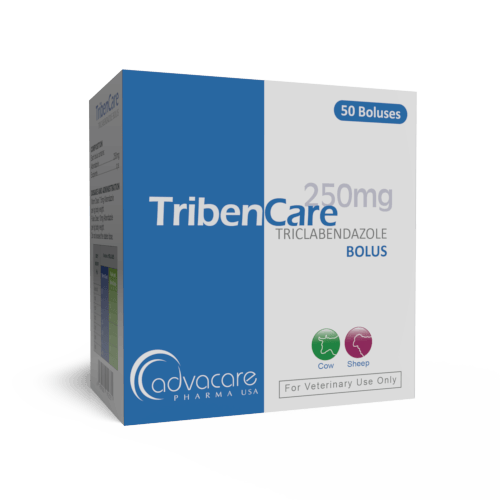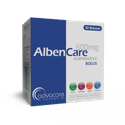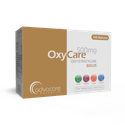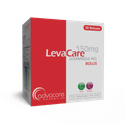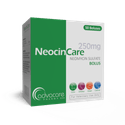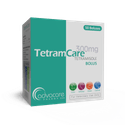- Home›
- Veterinary Pharmaceuticals›
- Veterinary Boluses›
- Triclabendazole Boluses
Triclabendazole Boluses
Dosage
Packaging
What is Triclabendazole?
Active Ingredients: Triclabendazole
Triclabendazole Boluses are an anthelmintic drug used to treat or prevent certain parasitic infections in animals like cows and sheep. It's indicated for the treatment of mixed trematode (fluke) and nematode, or arthropod infections, due to gastrointestinal roundworms, lungworms, liver fluke, and nasal bots.
Triclabendazole is classified as a benzimidazole within the family of anthelmintics. It works by inhibiting microtubule formation within the parasite. Triclabendazole shows a narrow spectrum of activity but is an effective treatment for early immature, immature, and mature liver fluke (Fasciola hepatica). It has an efficacy of 98 to 100% against 6- to 8-week-old flukes in the liver tissue and adults in the bile ducts and has a safety margin of up to 16 in sheep.
Benzimidazoles exhibit water solubility, facilitating their administration in various oral forms such as boluses, pastes, or suspensions. The extent of absorption in the gastrointestinal tract varies among different animal species and is influenced by factors like formulation, dosage, solubility, and the esophageal groove reflex.
The pathway of anthelmintic drugs within the body is complex, involving processes such as absorption into the bloodstream, distribution to various body parts, and eventual elimination through feces and urine, following metabolic processes in the liver. Given the diverse locations of parasites, with some residing in the lumen and others in the lungs, effective absorption from the gastrointestinal tract is essential.
Ruminants benefit significantly from this drug. They experience slow passage through the rumen, making it particularly advantageous for these animals.
This drug is also available in the form of oral suspension.
It is important to note Triclabendazole Boluses are for veterinary purposes only.
AdvaCare Pharma is the producer and global exporter of Triclabendazole Boluses. Our factories are regularly inspected to ensure meet the high standards necessary to comply with GMP rules and regulations.
Why are we a top Triclabendazole manufacturer?
AdvaCare Pharma is an American-owned and operated company specializing in the manufacture of veterinary medicines. As part of our range of 250+ veterinary formulations, we manufacture Triclabendazole Boluses under strict GMP guidelines, ensuring efficacy. Our veterinary distributors have confidence in the quality of our products, making AdvaCare Pharma a leading bolus manufacturer and supplier to countries where dependable, cost-effective livestock medications are in high demand.
Uses
What is Triclabendazole used for?
It's used to treat parasitic infections caused by liver flukes.
What animals can be treated with Triclabendazole Bolus?
It's recommended for cows and sheep. It is not used for swine or poultry, as flukes are typically not present in these animals.
How can Triclabendazole Boluses help in the treatment of Fasciola hepatica in sheep?
Triclabendazole is proven to be highly active both against 4-week-old and mature stages of Fasciola hepatica in experimentally infected sheep. This drug can have a fasciolicidal effect in severe naturally-acquired subacute to chronic fascioliasis in sheep.
This drug can also help in the treatment process of Fasciola in goats. Lower doses can remove adult flukes from infected goats. Triclabendazole is well tolerated in sheep and goats. It has broad activity against immature Fasciola hepatica of different ages and adult stages.
Triclabendazole at 10mg/kg, PO, is highly effective against immature Fasciola hepatica in the liver parenchyma and against the mature stage in the bile ducts. Out of all benzimidazoles, only triclabendazole is indicated for the treatment of acute fascioliasis.
Can animals become resistant to Triclabendazole?
Animals can easily develop a resistance to a certain drug. Triclabendazole is the most commonly used drug in the treatment of liver flukes in animals. The frequency and the increased intensity of drug use can lead to drug resistance in animals. In these cases, the drug becomes less effective. To avoid drug resistance, include good parasite management strategies and rotate different anthelmintics. Good pasture management and good hygiene in farms can help in avoiding drug resistance.
What is the epidemiology of Fasciola hepatica in animals?
Fasciola hepatica has a complex life cycle. The adult fluke lays eggs in the bile duct. The eggs then pass out in feces. Humid weather and temperature higher than 10 degrees can lead to egg hatching. This leads to massive multiplication and production of metacercariae. The cyst around them protects them from environmental factors. Animals can get reinfected from unclean pastures by ingesting the metacercariae, and the life cycle of the parasite starts again. This disease usually occurs in August/September, and the farmers must be especially careful during this period. Subacute or chronic infections occur from November through January. Mild temperatures and humid weather can lead to liver flukes. The optimum conditions for fluke development are from May to July. Damp and muddy areas also increase the chances of liver flukes.
Is only Triclabendazole enough for treating liver flukes in animals?
Controlling liver flukes in animals is a complex process that consists of many steps. The animals should be treated with Triclabendazole. Proper supplements must be added to the animal’s diets in order to improve their overall health. Farmers must maintain proper hygiene measures. The pastures must be clean and free of any dirtiness as much as possible. Farmers and veterinarians should monitor fluke infestations by using fecal egg counts and milk tank antibody levels. Infected animals should be separated from the herd, and proper isolation/quarantine must be provided.
Which clinical signs can be addressed with this drug?
Adding this drug in cases of liver flukes can reduce the clinical signs and improve the overall health of the animals. The treated animals can lead to normal body weight, which can lead to normal food conversion efficiency. Cattle and sheep can have normal milk production and normal fertility if treated on time and properly. Animals can get a normal color of the mucous membranes, and anemia can be reduced. The swelling underneath the jaw can be reduced. Also, gastrointestinal side effects like diarrhea can be addressed.
Treating the animals on time can reduce the chances of secondary infections like Clostridium novyi. Already infested animals have a low immune system and are susceptible to many infections. Treating the animals can prevent bacterial infections.
How should Triclabendazole Boluses be stored?
They should be stored in a dark, dry location below 25°C. Keep the boluses in the blister packs until usage.
Is there a withdrawal period after treatment with Triclabendazole?
The withdrawal time is 56 days for meat and 48 hours for milk. The exact duration will depend on local regulations.
Dosage
How much Triclabendazole should be given to livestock?
For cattle, the usual dose is 12mg per kg of body weight.
For sheep, the usual dose is 10mg per kg of body weight.
The dosage depends on the animal species and the overall health of the animals.
Refer to a veterinary doctor or pharmacist for guidelines on dosage.
Side Effects
As with all pharmaceuticals, some unwanted effects can occur from the use of Triclabendazole Bolus.
Some common side effects may include but are not limited to:
- gastrointestinal effects
- urticaria or pruritus
Serious side effects may include allergy or hypersensitivity reactions. Other side effects include nausea, vomiting, or dizziness. However, the report of the side effects is minimal.
For a comprehensive list of all possible side effects of this medication, consult a veterinarian.
Precautions
Do NOT use a Triclabendazole Bolus for an animal that:
- has a known allergy or hypersensitivity to any of the ingredients.
- is hypersensitive to any other benzimidazole.
- is an ewe producing milk for human consumption.
This drug may cause prolonged QT intervals. Treatment with this drug should be administered with caution if an animal has a history of QT prolongation or is being treated with a medicine that causes a prolonged QT interval.
This drug should not be used during cattle or sheep milk production for human use.
Triclabendazole is highly toxic to aqueous animals and should not be used for treating parasite infection in fish. It can also pollute the water of the fish.
Be extra cautious if the animal is allergic to this medicine. Humans who are allergic to this product should avoid direct skin contact, and it is recommended to wear gloves and to wash hands thoroughly after handling.
In the event of accidental overdosing, prompt management is crucial. It is crucial to adhere to the recommended dosage provided by the veterinarian. If a dose is missed, avoid administering two doses simultaneously. Overdosing can have adverse effects on the nervous, cardiovascular, and gastrointestinal systems.
Maintaining good hygiene practices during the administration of this drug is essential to prevent reinfestation within the animal's environment. Even after successful treatment, animals can become reinfected if their surroundings are infested with parasites due to poor environmental hygiene.
Post-deworming, it is advisable to keep animals in a dry lot for 12 to 24 hours. This precautionary measure helps prevent the deposition of eggs and larvae in the pasture, reducing the risk of reinfection for the animals.
Keep this product out of reach of children and animals.
What are the most common animals for which Triclabendazole Boluses are used?
Triclabendazole Boluses are primarily used to treat or prevent certain parasitic infections in animals like cows and sheep. It is mostly used for treating trematode infections like flukes and nematodes, or arthropod infections, due to gastrointestinal roundworms, lungworms, liver fluke, and nasal bots.
Cow Parasite Infection
This drug is mostly used for treating trematodes in cows.
Sheep Parasite Infection
Triclabendazole in sheep is the most used anti-fasciola drug. It can be helpful in the treatment process of many parasites.
You might be interested in...
Why AdvaCare Pharma?
As an industry leader, we are aware of our responsibility to provide affordable and sustainable solutions to improve healthcare worldwide.
